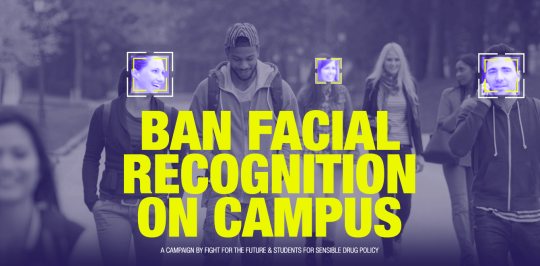Students & Activists Launch Nationwide Campaign to Stop Facial Recognition From Spreading to College Campuses

EMBARGOED until 6am EST on Tuesday, January 14
Contact: Evan Greer, press@fightforthefuture.org, 978-852-6457
Fight for the Future and Students for Sensible Drug Policy are combining forces to prevent dangerous and discriminatory biometric surveillance from destroying student privacy, campus safety, and academic liberty
Fresh off a highly successful campaign to stop the use of facial recognition at concerts and music festivals, digital rights group Fight for the Future has teamed up with Students for Sensible Drug Policy to launch a nationwide effort to ban facial recognition from university campuses across the USA. The groups made the announcement today, and launched a website and toolkit for student groups across the country.
See the campaign page here: banfacialrecognition.com/campus
Tech and security companies are marketing facial recognition technology to schools as a form of security and convenience. But in reality this technology decreases actual security on campuses, and opens up a pandora’s box of privacy, civil liberties, and equity issues.
Students, faculty, alumni, and community members are signing petitions calling for a complete ban on the non-personal use of facial recognition on their campus. At campuses around the country, including George Washington in DC and DePaul in Chicago, student groups are organizing to introduce student government resolutions to ban facial recognition. 40 major university administrations including Stanford, Harvard, and Northwestern will be contacted to clarify if they are using this problematic technology.
“Facial recognition surveillance spreading to college campuses would put students, faculty, and community members at risk. This type of invasive technology poses a profound threat to our basic liberties, civil rights, and academic freedom,” said Evan Greer, Deputy Director of Fight for the Future (pronouns: she/her). “Schools that are already using this technology are conducting unethical experiments on their students. Students and staff have a right to know if their administrations are planning to implement biometric surveillance on campus. Grassroots organizing stopped facial recognition from ruining music festivals. Now we’re going to stop it from invading university campuses.”
“Contaminating learning environments with this technology will only harm those it claims to protect. It is untrue that facial recognition makes anyone safer,” said Erica Darragh (she/her), board member at Students for Sensible Drug Policy. “Students should not have to trade their right to privacy for an education, and no one should be forced to unwittingly participate in a surveillance program which will likely include problematic elements of law enforcement. This automation of racial and political profiling threatens everyone, especially students, faculty, and campus guests of color. Students have an obligation to prevent this technology going mainstream, beginning with university campuses, where we have the most power and we know how to win.”
“Facial recognition technology isn’t safe. It’s biased, and more likely to misidentify students of color. The data collected is vulnerable to hackers, and in the wrong hands could be used to target and harm students. And it’s invasive, enabling anyone with access to the system to watch students’ movements, analyze facial expressions, monitor who they talk to, what they do outside of class, and every move they make,” Evan Greer concluded.
While there have been several reports indicating that elementary and grade schools are experimenting with facial recognition, the technology is not widely used at US colleges and universities. That said, there are exceptions. University of San Francisco, for example, implemented face scans at some of their dormitories in 2018. This CNET article mentions another vendor who claims their tech is being used at Stanford and University of Southern California. Facial recognition vendors are aggressively marketing their technology to schools, including colleges and universities. So unless we draw a line in the sand, it’s almost inevitable that this invasive surveillance will continue to spread. .
This effort is part of Fight for the Future’s broader BanFacialRecognition.com campaign, which has been endorsed by more than 30 major grassroots civil rights organizations including Greenpeace, Color of Change, Daily Kos, United We Dream, Council on American Islamic Relations, MoveOn, and Free Press. The groups are calling for local, state, and federal lawmakers to ban government and law enforcement use of facial recognition. Several cities have already banned the controversial technology outright, including San Francisco, Somerville, MA, Berkeley, CA, and Oakland, CA, and there is growing bipartisan support in Congress to address the issue at the federal level.
###

